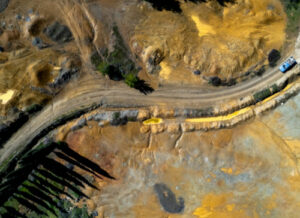
Africa’s gold industry remains one of the continent’s most significant economic drivers, contributing substantially to GDP, export earnings, and job creation. Countries such as Ghana, South Africa, and Mali rank among the world’s top gold producers, and the sector supports millions of livelihoods directly and indirectly. From large-scale mining operations to artisanal and small-scale mining (ASM), gold continues to attract foreign direct investment and fuel infrastructure development in mineral-rich regions.
However, the rapid expansion of gold extraction has brought serious environmental consequences. Open-pit mining, deforestation, mercury contamination, and water pollution have become common in areas with weak regulatory oversight. In places like the Democratic Republic of Congo and Burkina Faso, unregulated artisanal mining often leads to land degradation and hazardous working conditions. These environmental costs raise concerns about the long-term sustainability of the industry and its effect on rural communities and ecosystems.
With increasing global attention on ethical sourcing and environmental responsibility, African gold producers face mounting pressure to reform. International standards such as the OECD Due Diligence Guidelines and the Kimberley Process are influencing policy shifts, while certification schemes like Fairtrade Gold are promoting responsible practices. The future of Africa’s gold sector depends on its ability to strike a balance, ensuring that economic benefits do not come at the expense of environmental health or community welfare.
The Ecological Toll of Extraction
Gold mining, particularly when unregulated, poses significant threats to ecosystems. Open-pit mining, commonly practised across the continent, involves clearing vast tracts of land, leading to deforestation, soil degradation, and loss of biodiversity. Mercury and cyanide, frequently used in processing, leak into rivers, affecting not only aquatic life but the health of communities that depend on these water sources.
Artisanal and small-scale mining, while providing livelihoods to millions, is often conducted without adequate safeguards. In places like the Democratic Republic of Congo and Burkina Faso, children are known to work in hazardous conditions, and the informal nature of operations makes regulation challenging.
The Rise of Responsible Mining Initiatives
 Recognising these challenges, many African governments and international partners have launched initiatives aimed at creating a more sustainable gold industry. Certification schemes such as the Fairmined and Responsible Gold initiatives aim to trace gold from mine to market, ensuring it is sourced in a way that respects human rights and the environment.
Recognising these challenges, many African governments and international partners have launched initiatives aimed at creating a more sustainable gold industry. Certification schemes such as the Fairmined and Responsible Gold initiatives aim to trace gold from mine to market, ensuring it is sourced in a way that respects human rights and the environment.
South Africa and Ghana have taken the lead in tightening environmental standards and investing in green mining technologies. Some operations are now using closed-loop water systems, solar-powered machinery, and mercury-free processing techniques.
True sustainability in mining goes beyond environmental compliance, it requires social licence. In areas where mining operations have historically led to displacement or inequality, companies are now being pushed to consult with local communities, offer employment, and invest in infrastructure such as schools and clinics.
In Tanzania, for example, mining companies have been encouraged to contribute to local development plans. Meanwhile, in Mali, cooperatives of artisanal miners are being formalised, allowing them access to financing and safer technology.
A Green Future for Gold
The global demand for ethically sourced gold is growing, driven by consumers and investors who want to know the origin of their purchases. This represents a major opportunity for African producers. By aligning with ESG (Environmental, Social, and Governance) principles, they can not only attract better investment but also future-proof their industries.
However, this transition requires political will, regional cooperation, and capacity-building at all levels. Governments must strengthen enforcement mechanisms, support local miners with training, and incentivise the adoption of cleaner technologies.
Sustainable gold mining is not a utopian dream, it is an achievable necessity. Africa’s vast mineral wealth can and must be a lever for inclusive growth, not environmental decline. By placing sustainability at the heart of gold production, the continent has the chance to lead, not just in output, but in ethics, innovation, and shared prosperity.



